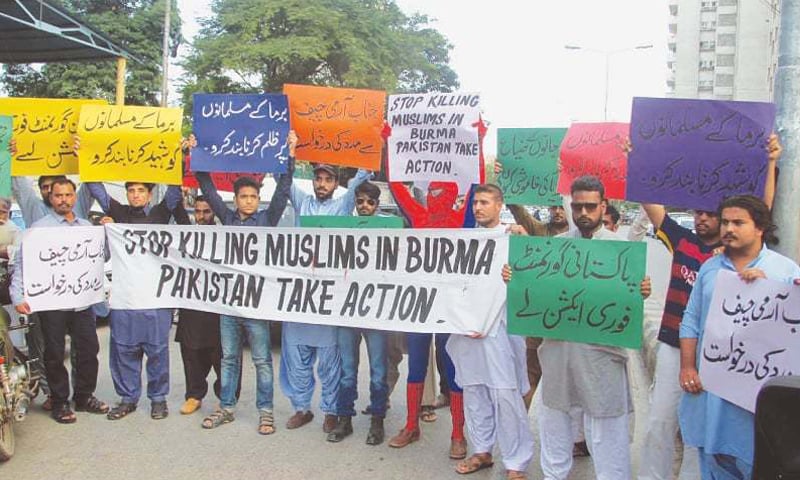China promises to help Bangladesh repatriate of Rohingya refugees to Myanmar

A protest in Karachi against the Rohingya massacre in Myanmar - file foto
China has promised to help Bangladesh repatriate thousands of Rohingya refugees to Myanmar. More than a million Rohingyas who fled Myanmar for their lives are refugees in Bangladesh.
Bangladesh Foreign Minister AK Abdul Momin held discussions with his Chinese counterpart Wang Yi in Dhaka.
According to an estimate of the National Alien Registration Authority, there are about half a million Rohingyas in the city. But experts and community leaders believe their number is higher as the illegal immigrants are seldom counted in national census while the last time a census was held in Karachi was in 1998.
Bangladesh Foreign Minister AK Abdul Momin held discussions with his Chinese counterpart Wang Yi in Dhaka.
Bangladeshi Foreign Minister Momin said that China has built about 3000 houses in Myanmar’s Rakhine province to accommodate potential Rohingyas returning from Bangladesh to Myanmar. So in the beginning he will also make arrangements for food and water. “We should thank China for being willing to do this,” the foreign minister said.
Bangladesh’s former ambassador and analyst in Beijing Munshi Faiz Ahmed said while talking to the American news agency, “Bangladesh needs China’s cooperation to solve the Rohingya crisis.” An agreement was reached with Myanmar in November 2017, which called for the repatriation of around seven million Rohingya Muslims from Bangladesh. After that, two attempts were made to send the refugees back in 2019. However, these efforts failed as the Rohingya refugees refused to go back. They say that if they go back to Myanmar, they are afraid of being subjected to violence once again, which they fled to avoid. This fear has increased since the military coup in Myanmar last year.
Bangladesh is taking steps to complete the refugee identification process. Officials say that the biometric data of more than 800,000 refugees living in various camps in Bangladesh has been sent to Myanmar.
Rohingya refugees in Pakistan
In the early years of their migration, they felt comparatively comfortable and welcome in the Muslim state of Pakistan. Their large-scale migration had made Karachi one of the largest Rohingya population centres outside Myanmar but afterwards the situation started turning against them, a leading English daily reported.
But the Rohingyas generally call themselves Bengalis. “It is because they want to show that they have also migrated to Pakistan before the fall of Dhaka and it helps them get naturalised citizenship,” a Bengali community leader in Machchar Colony area of Karachi said.
Experts say that migration of both Bengalis and Burmese started in 1980s, which had continued intermittently until 1998. “Because of a liberal policy towards migrants and refugees during Gen Ziaul Haq’s military regime, major Rohingya exodus took place (to Karachi),” experts said.
Experts opine, during Zia’s regime, they were brought to Pakistan for two purposes – study in madresshas and participate in Afghan jihad. Zia offered them residence permits in Pakistan and thousands landed in Karachi. But they were never granted citizenship.
Bangladeshi Foreign Minister Momin said that China has built about 3000 houses in Myanmar’s Rakhine province to accommodate potential Rohingyas returning from Bangladesh to Myanmar. So in the beginning he will also make arrangements for food and water. “We should thank China for being willing to do this,” the foreign minister said.
Bangladesh’s former ambassador and analyst in Beijing Munshi Faiz Ahmed said while talking to the American news agency, “Bangladesh needs China’s cooperation to solve the Rohingya crisis.” An agreement was reached with Myanmar in November 2017, which called for the repatriation of around seven million Rohingya Muslims from Bangladesh. After that, two attempts were made to send the refugees back in 2019. However, these efforts failed as the Rohingya refugees refused to go back.
They say that if they go back to Myanmar, they are afraid of being subjected to violence once again, which they fled to avoid. This fear has increased since the military coup in Myanmar last year.
Bangladesh is taking steps to complete the refugee identification process. Officials say that the biometric data of more than 800,000 refugees living in various camps in Bangladesh has been sent to Myanmar.





